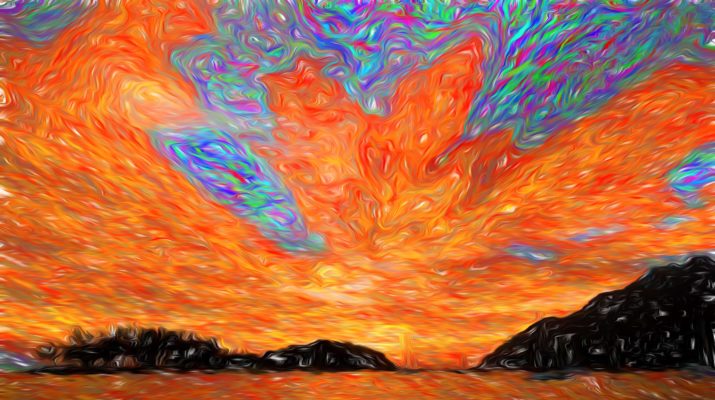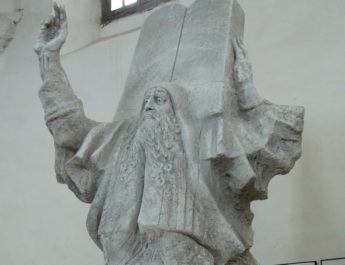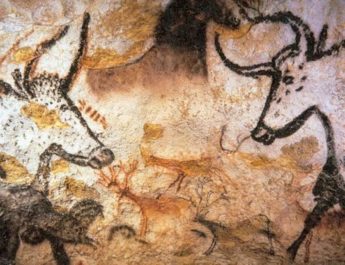Job 38:1-11
Ordinary B30
1 Then the LordA answeredB JobC out of the whirlwind:D
A “Lord” = YHVH. From havah (to be, become) or hayah (to come to pass, become, be). This is the name of the God of Israel, the self-existent and eternal one, the tetragrammaton. This pronunciation has been lost to time so “Lord” is generally used in its place.
B “answered” = anah. This is answer, respond, announce, sing, shout, or testify. It means to pay attention, which implies responding and, by extension, starting to talk. Used in a specific sense for singing, shouting, testifying, etc.
C “Job” = Iyyob. Perhaps from ayab (to hate or be hostile to). This is Job a name that may mean “hated,” “enemy,” “persecuted,” “returning,” “no father,” or “where is my father?” Seehttps://www.abarim-publications.com/Meaning/Job.html
D “whirlwind” = saar. From sa’ar (to storm, scattered by a storm, blow away, rage, storm tossed; this is to toss in a literal or figurative sense). This is a storm or whirlwind. It can also be stormy.
2 “Who is this that darkensE counselF by wordsG without knowledge?H
E “darkens” = chashak. 18x in OT. This is to be or become dark. It can also mean to dim or hide.
F “counsel” = etsah. From yaats (to counsel, advise, determine). This is advice, purpose, plan, prudence, or counselor.
G “words” = millah. From malal (to say, speak; often used in a poetic sense). This is something said – a word, speech, talking, or discourse.
H “knowledge” = daat. From yada (to know, be aware, see and so understand – includes observation, care, recognition; can also be used as a euphemism). This is knowledge, unawares, cunning, wittingly.
3 Gird upI, J your loinsK like a man,L
I will questionM you, and you shall declareN to me.
I “gird up” = azar. 16x in OT. This is to encircle, bind, encompass, to belt or gird.
J {untranslated} = na. This particle is used for requests or for urging. It can be we pray, now, I ask you, oh. This is the same “na” in “hosanna.”
K “loins” = chalats. 10x in OT. From chalats (to arm, give strength). This is loins or waist. Figuratively, this refers to fertility or vigor.
L “man” = geber. From gabar (to be strong or mighty; to prevail or to be insolent) This is man, warrior, a person generally, or a valiant person.
M “question” = shaal. This is to ask, inquire, beg, borrow, desire, request. It can also mean to demand.
N “declare” = yada. Related to “knowledge” in v2. See note H above.
4 “Where wereO you when I laid the foundationP of the earth?Q
TellR me, if you have understanding.S
O “were” = hayah. Related to “Lord” in v1. See note A above.
P “laid the foundation” = yasad. This is to establish, appoint, instruct. It is to set in a literal or figurative sense. Also means to sit down together and so to consult or take counsel.
Q “earth” = erets. Root may mean to be firm. This is earth, ground, field land, or country.
R “tell” = nagad. This is to declare, make conspicuous, stand in front, manifest, predict, explain.
S “have understanding” = yada + binah. Yada is the same as “declare” in v3. See note N above. Binah is from bin (to discern, consider, attend to; distinguishing things in one’s mind or, more generally, to understand). This is understanding, wisdom, meaning, discernment.
5 Who determinedT its measurementsU—surely you know!V
Or who stretchedW the lineX upon it?
T “determined” = sum. This is to put or place in a literal or figurative sense. It can be appoint, care, change, make, and may other things.
U “measurements” = memad. 1x in OT. From madad (to measure, stretch, be extended, continue). This is a measure or measurement.
V “know” = yada. Same as “declare” in v3. See note N above.
W “stretched” = natah. This is to stretch or spread out, to extend, or bend. In can also imply moral deflection.
X “line” = qav. 18x in OT. From qavah (to wait, look, gather together, bind together, collect; figuratively, to expect). This is a line or cord for connecting or measuring. Figuratively, it can mean a rule, rim, agreement, or the string of a musical instrument.
6 On what were its basesY sunk,Z
or who laidAA its cornerstoneBB
Y “bases” = eden. From the same as adon (lord, master, owner); root means to rule or be sovereign. This is a base, pedestal, or foundation.
Z “sunk” = taba. 10x in OT. This is sink, drown, settle, or fasten.
AA “laid” = yarah. This is to throw, shoot, be stunned. It is to flow as water so figuratively to instruct or teach. This is the same root that “Jerusalem” and “Torah” draw from.
BB “cornerstone” = eben + pinnah. Eben is a stone, weight, or mason. It is part of the word “Ebenezer.” Pinnah is perhaps from pen (corner, angle, street, wall). This is an angle, corner, cornerstone, tower, bulwark, pinnacle. Figuratively, it can be a chieftan.
7 when the morningCC starsDD sangEE togetherFF
and all the heavenly beingsGG shouted for joy?HH
CC “morning” = boqer. From baqar (to seek, plow, break forth, admire, care for). This refers to the break of day. So it is dawn, early, morning, or morrow.
DD “stars” = kokab. Perhaps from the same as kavah (to prick, blister, burn, scorch). This is a star as shining, stargaze. Figuratively, can mean prince.
EE “sang” = ranan. This is a cry of joy or a joyful song. Properly, it is emitting a shrill sound, especially one of joy.
FF “together” = yachad. From yachad (to join, be united). This is a unit, both, altogether, unitedness, alike.
GG “heavenly beings” = ben + elohim. Literally “sons of God.” Ben is from banah (to build or obtain children). This is son, age, child. It is son in a literal or figurative sense.
HH “shouted for joy” = rua. To break or destroy something so figuratively, an ear splitting sound such as a call of alarm or a joyful sound.
8 “Or who shut inII the seaJJ with doorsKK
when it burst outLL from the womb?MM—
II “shut in” = sakak. This is to cover or overshadow. It could also be to hedge or fence it. Figuratively, this could be to defend, protect, or join together.
JJ “sea” = yam. Root may mean to roar. This is the sea, often referring to the Mediterranean. It comes from the root in the sense of the roar of crashing surf. This word is sometimes used for rivers or other sources of water. It can mean to the west or to the south.
KK “doors” = delet. From dalah (to draw, lift up; properly, to dangle; draw water; figuratively, to deliver). This is something that swings like a door, gate, leaf, lid, or other opening.
LL “burst out” = giach + yatsa. Giach is 6x in OT. This is to break forth like water bursting out, to rush, give birth. Yatsa is to go or come out, bring forth, appear. It is to go out in a literal or figurative sense.
MM “womb” = rechem. Related to racham (compassion, tender love, womb, compassion; the womb as that which cherishes the fetus). This is a womb.
9 when I madeNN the cloudsOO its garment,PP
and thick darknessQQ its swaddling band,RR
NN “made” = sum. Same as “determined” in v5. See note T above.
OO “clouds” = anan. May be from anan (cover, cloud over; figuratively, acting in a secret way, practicing magic or soothsaying). This is a cloud as something that covers the sky.
PP “garment” = lebush. From labash (to wrap around, which implies clothing oneself or someone else; wrapping around in a literal or figurative way). This is clothing literally or figuratively. It can be used as a euphemism for a wife.
QQ “thick darkness” = araphel. 15x in OT. From araph (to droop, drip, drop). This is a cloud or deep darkness. It is gloom or gloomy as the sky being lowered.
RR “swaddling band” = chathullah. 1x in OT. From chathal (to wrap, swathe). This is a swaddling cloth in a literal or figurative sense.
10 and prescribedSS boundsTT for it,
and setUU barsVV and doors,
SS “prescribed” = shabar. This is break, collapse, destroy, break in pieces, tear. It is bursting in a literal or figurative sense.
TT “bounds” = choq. From chaqaq (to inscribe, carve, or decree; a lawmaker; literally, this is engraving, but it implies enacting a law because laws were carved into stone or metal). This is statute, boundary, condition, custom, limit, ordinance It is something that is prescribed or something that is owed.
UU “set” = sum. Same as “determined” in v5. See note T above.
VV “bars” = beriach. From barach (to flee, drive away, hurry, to bolt). This is a bar or a bolt. It can also be used for a fugitive.
11 and said, ‘Thus far shall you come,WW and no farther,XX
and here shall your proudYY wavesZZ be stopped’?AAA
WW “come” = bo. This is to enter, come in, advance, fulfill, bring offerings, enter to worship, attack. It can also have a sexual connotation.
XX “farther” = yasaph. This is to add, increase, continue, exceed.
YY “proud” = ga’own. From the same as ga’avah (majesty, excellency, pride, arrogance, ornament); from gaah (to rise up, be exalted, triumph; figuratively, be majestic). This is majesty, pride, redemption, pomp, excellency, swelling, or arrogance.
ZZ “waves” = gal. From galal (to roll, roll away, wallow, commit, remove; rolling in a literal or figurative sense). This is a wave, billow, rock pile, something rolled, a spring of water.
AAA “stopped” = shith. This is to place, set, bring, appoint, consider, bring, array or look.
Image credit: “Sunset at Tarutao Archipelago” by Phuketian.S, 2016.




